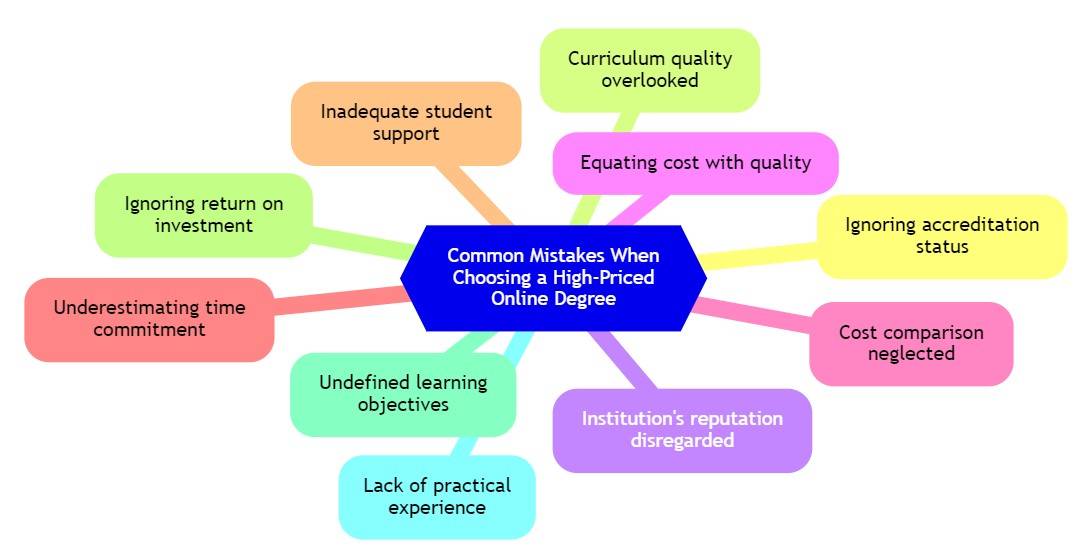10 Common Mistakes When Choosing a High-Priced Online Degree
Are you thinking of investing in a high-priced online degree? If your answer is "Yes," then before making a decision, it's important to be aware of the common mistakes that many students or candidates make when choosing such programs. The high-cost degree program you choose can greatly impact your future career opportunities. Hence, it's important to avoid potential pitfalls.
Table of Content (TOC)
- Ignoring accreditation status
- Curriculum quality overlooked
- Institution's reputation disregarded
- Equating cost with quality
- Cost comparison neglected
- Underestimating time commitment
- Inadequate student support
- Ignoring return on investment
- Undefined learning objectives
- Lack of practical experience
Mistake 1: Ignoring accreditation status
Enrolling in a program without verifying its accreditation from recognized authorities can lead to a degree that may not be accepted by employers or higher education institutions. In India, the University Grants Commission (UGC) and regulatory bodies like AICTE, BCI, and MCI are responsible for accrediting higher education programs. According to the University Grants Commission (UGC) data, over 800 fake universities were operating in India as of 2022, highlighting the importance of accreditation checks.
Must Explore: Online MCA Courses
Best-suited Teaching and Research courses for you
Learn Teaching and Research with these high-rated online courses
Mistake 2: Curriculum quality overlooked
Suppose a candidate fails to evaluate the program's curriculum, teaching methods, and overall educational quality. In that case, it can result in a poor learning experience, inadequate preparation for the job market, further studies, and difficulty meeting industry expectations. A survey by AICTE in 2023 revealed that over 30% of engineering graduates lacked the essential skills required by employers.
Also Read: Online MSC Course
Mistake 3: Institution's reputation
Choosing a program from an institution with a poor reputation or limited alumni network can diminish the value of the degree and impact future career prospects. Reputable institutions have strong industry connections that benefit their students by helping them get better job opportunities and networking.
Must Explore: Online BCA Course
Mistake 4: Equating cost with quality
Assuming that a higher price tag automatically translates to better education is a common misconception. While it's true that reputable institutions may charge higher fees, it's crucial for a candidate to carefully evaluate the program's quality, resources, faculty expertise, and outcomes before making a decision only based on cost. Making an informed decision based on these factors rather than cost alone is paramount when choosing the right educational path.
Also explore: Online BBA Courses
Mistake 5: Cost comparison neglected
Not comparing the program's cost with similar offerings from other reputable institutions can lead to overpaying for a degree that may provide comparable value at a lower price. For example, the Online MCA (Master of Computer Applications) program at Amity Online costs around ₹1,70,000 in 2024. Meanwhile, the same program at Online Manipal is priced at ₹1,58,000 (as of 2024).
Despite both institutions being reputable, the noteworthy difference in fees underscores the necessity of cost comparison. This comparison ensures that you do not overpay for a degree that offers similar outcomes.
Mistake 6: Underestimating time commitment
Enrolling in an online program requires a significant time and effort investment. A candidate needs to acknowledge and plan for the workload, as underestimating the time commitment can lead to poor performance or incomplete studies.
A 2022 survey by AICTE found that over 40% of online students faced challenges with time management, resulting in lower completion rates. Hence, it's paramount to recognize that online programs need a considerable amount of time and dedication for a candidate to succeed.
Mistake 7: Inadequate student support
Enrolling in a program that lacks robust student support services, such as academic advising, technical assistance, and career counselling, can hinder academic progress and future success. Adequate student support is needed in order to help students navigate their academic journey, troubleshoot technical challenges, and make informed decisions about their career paths.
Without these support services, students may struggle to stay on track, resolve issues, and plan for their future, ultimately impacting their overall academic experience.
Must Explore:


Mistake 8: Ignoring return on investment
One common mistake is failing to consider the potential return on investment and career prospects after graduation. Assessing whether a degree will provide the desired professional and financial benefits in the long run is important. This consideration can help avoid investing time and resources into a degree that may not offer the expected returns.
Mistake 9: Undefined learning objectives
One common mistake is not setting clear learning objectives when choosing a program. Without defined learning objectives, there can be a lack of focus and direction, which may compromise the overall educational experience.
Mistake 10: Lack of practical experience
Another common mistake is overlooking the significance of practical experiences such as internships or capstone projects. Neglecting these opportunities can limit the real-world application of knowledge and skills gained during studies, which are highly sought after by employers.
Must Read:






Vikram has a Postgraduate degree in Applied Mathematics, with a keen interest in Data Science and Machine Learning. He has experience of 2+ years in content creation in Mathematics, Statistics, Data Science, and Mac... Read Full Bio




